Month: March 2022
Carlos Barbosa-Lima (1944 – 2022) Brazilian Classical And Jazz Guitarist
Sunday Poem
The Mushrooms of Donbas
….—excerpt
. . . and what are we going to tell our children,
how are we going to look them in the eye?
There are just things you have to answer for, things
you can’t just let go.
You are responsible for your penicillin,
and I am responsible for mine.
In a word, we just fought for our mushroom plantations. There we
beat them. And when they fell on the warm hearts of the mushrooms
we thought:
Everything that you make with your hands, works for you.
Everything that reaches your conscience beats
in rhythm with your heart.
We stayed on this land, so that it wouldn’t be far
for our children to visit our graves.
This is our island of freedom
our expanded
village consciousness.
Penicillin and Kalashnikovs – two symbols of struggle,
the Castro of Donbas leads the partisans
through the fog-covered mushroom plantations
to the Azov Sea.
“You know,” he told me, “at night, when everyone falls asleep
and the dark land sucks up the fog,
I feel how the earth moves around the sun, even in my dreams
I listen, listen to how they grow –
the mushrooms of Donbas, silent chimeras of the night,
emerging out of the emptiness, growing out of hard coal,
till hearts stand still, like elevators in buildings at night,
the mushrooms of Donbas grow and grow, never letting the discouraged
and condemned die of grief,
because, man, as long as we’re together,
there’s someone to dig up this earth,
and find in its warm innards
the black stuff of death
the black stuff of life.
by Serhiy Zhadan
from Maradona
Publisher: Folio, Kharkiv, 2007
Translation: Virlana Tkacz and Wanda Phipps, 2011
Entire poem in translation and original Ukranian: here
The Art of Monetary War
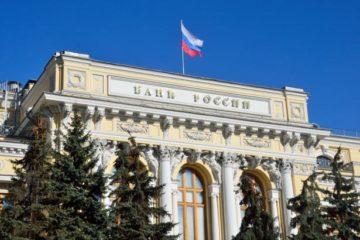 Dominik A. Leusder in n+1:
Dominik A. Leusder in n+1:
THE SCALE OF THE WESTERN RESPONSE to Russia’s invasion of Ukraine has been as surprising as the invasion itself. In the span of a few days, a highly integrated capitalist economy was wrenched out of the networks of financial globalization with unprecedented speed and comprehensiveness. Two and a half weeks after Russia launched its horrific war, the country is isolated, its economic linkages with the outside world growing more attenuated by the day.
The initial focus of Western sanctions—on the assets and financial transactions of key Russian businessmen and companies—didn’t come as a particular surprise. Some of the same targets had already been sanctioned in the wake of Russia’s first incursion into Ukraine in 2014. As the political pressure to punish Russia mounted, the US, UK, and EU announced the ejection of Russian banks from SWIFT, the global interbank messaging system. By prohibiting correspondent banking relationships with banks in New York, the West ultimately pushed Russia out of the global dollar-based clearing and settlement system.
Exclusion from the global payment system was a major step up in the escalation. But Western leaders were still on familiar territory. Iranian banks were excluded from SWIFT in 2012, and correspondent banking relationships were severed in 2019. And crucially, the US and EU had made sure to exempt all transactions related to energy: Russian gas and oil could continue to flow. It’s the subsequent measures, put in place in the Sunday after the invasion, that have constituted the real geoeconomic break: the freezing of Russian’s foreign reserve assets held abroad, and the outright ban on transactions with the Russian central bank.
More here.
Cold Peace
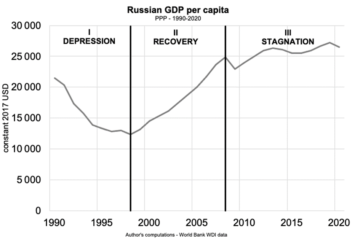 Cedric Durand in the New Left Review’s Sidecar:
Cedric Durand in the New Left Review’s Sidecar:
Petrov’s Flu (2021), the latest film by Kirill Serebrennikov, opens with a depiction of a crowded commuter bus in Russia. The atmosphere is febrile, almost violent. In the grip of a fever, the protagonist suffers a coughing fit and moves to the back of the vehicle. Following closely behind him, another passenger shouts, ‘We used to get free vouchers for a sanatorium every year. It was good for the people. Gorby sold us out, Yeltsin pissed it away, then Berezovsky got rid of him, appointed these guys, and now what?’ He concludes that ‘All those currently holding to power should be shot’. At this point, the protagonist steps off the bus and enters a daydream in which he joins a firing squad that executes a group of oligarchs.
‘These guys’ refers to Putin and his clique, while ‘now what?’ is a question that weighs heavily on the country they’ve created. What kind of society is contemporary Russia, and where is it headed? What are the dynamics of its political economy? Why did they spark a devastating conflict with its closely entwined neighbour? For three decades, cold peace reigned in the region, with Russia and the rest of Europe swimming together in the icy waters of neoliberal globalization. In 2022, following the invasion of Ukraine and the West’s economic and financial sanctions, we have entered a new era, in which the delusions that animated the country’s market transition have become impossible to sustain.
More here.
The New Paradigm: How Fares Post-Neoliberalism?
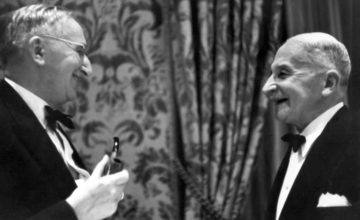 Quinn Slobodian in Democracy:
Quinn Slobodian in Democracy:
In early 2018, Larry Kramer, the dean of Stanford Law School and the president of the William and Flora Hewlett Foundation, which held assets of about $10 billion and disbursed around $400 million a year in grants, wrote a memo to the foundation’s board with a plan to end neoliberalism. Across 26 pages, he laid out a theory of recent U.S. history. By his account, the last four decades had seen the steady rise to dominance of a philosophy that operated around three interconnected beliefs: Society was composed of individuals seeking to maximize their own utility, progress was measured in metrics of monetary wealth, and the role of government was to enable markets to operate as freely as possible. The philosophy was incubated by a small group of intellectuals including Milton Friedman and Friedrich Hayek, who carried out a breathtaking victory march from the margins in the early postwar years of social democracy and Keynesianism to the center of American political consciousness. By the 1980s and 1990s, neoliberalism reached into every field of human endeavor from higher education to public policy. Kramer noted that philanthropy had played a major role in the success of neoliberalism, from the William Volker Fund to the Olin Foundation to the Koch Network. He proposed something radical to the board of the philanthropic body he directed: The Hewlett Foundation should take this history and flip it, reverse-engineer the neoliberal project and replace it with a new economic paradigm.
More here.
‘In the Margins’ Offers a Path Into Elena Ferrante’s Mind
Molly Young at the New York Times:
 In her theory of writing, Ferrante stands opposed to someone like Joan Didion. Didion famously insisted that she wrote in order to find out what she thought. (“Had I been blessed with even limited access to my own mind there would have been no reason to write.”) In Ferrante’s case, the act is a flawed transcription of what she calls “the brain wave.” For Didion, everything was gained in the voyage from mind to pen; for Ferrante, much goes missing.
In her theory of writing, Ferrante stands opposed to someone like Joan Didion. Didion famously insisted that she wrote in order to find out what she thought. (“Had I been blessed with even limited access to my own mind there would have been no reason to write.”) In Ferrante’s case, the act is a flawed transcription of what she calls “the brain wave.” For Didion, everything was gained in the voyage from mind to pen; for Ferrante, much goes missing.
As much as “In the Margins” is a philosophical monograph on the nature of writing, it is also a practical manual. Ferrante furnishes tips. She doesn’t present them as such — there’s no prescription, only an outline of what she’s learned and how it’s helped her (and by implication, how it might help anyone else).
more here.
‘Bitch’ by Lucy Cooke
Josie Glausiusz at The Guardian:
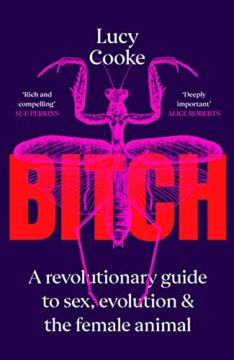 Offering a wealth of examples ranging from cannibal spiders to sex-switching reef fish, Cooke dismantles a mass of misconceptions about binary sex roles, many of which can be traced back to that beloved bearded icon, Charles Darwin. According to Darwinian dogma, male animals fight one another for possession of females, “perform strange tactics” and mate promiscuously, propelled by a biological imperative to spread their abundant seed. Females are monogamous and passive; they wait patiently for their large, energy-rich eggs to be fertilised by cheap and tiny sperm, then selflessly give their all to their offspring.
Offering a wealth of examples ranging from cannibal spiders to sex-switching reef fish, Cooke dismantles a mass of misconceptions about binary sex roles, many of which can be traced back to that beloved bearded icon, Charles Darwin. According to Darwinian dogma, male animals fight one another for possession of females, “perform strange tactics” and mate promiscuously, propelled by a biological imperative to spread their abundant seed. Females are monogamous and passive; they wait patiently for their large, energy-rich eggs to be fertilised by cheap and tiny sperm, then selflessly give their all to their offspring.
Cooke gleefully rebuts many of these assumptions about male dominance and female docility. Only 7% of animal species are sexually monogamous, meaning that throngs of female animals, from Barbary macaques to blue tits, seek sex with numerous partners. (A female lion, for example, can copulate with multiple males up to 100 times a day during oestrus.)
more here.
Lucy Cooke: Saving the Creeps
Boiling Oil, Red-Hot Irons, 26-Second Amputations: How Surgery Evolved
Henry Marsh in The New York Times:
 I find it difficult to imagine being a surgeon in the conditions in which my predecessors had to work — gloveless, covered in blood, with patients physically tied down and screaming in pain, not to mention a postoperative mortality of almost 50 percent. And yet in “Empire of the Scalpel,” Ira Rutkow quotes the 18th-century English surgeon William Cheselden, who wrote of himself: “No one ever endured more anxiety and sickness before an operation, yet from the time that I began to operate, all uneasiness ceased … [I was] never ruffled or disconcerted and [my hand] … never trembled during an operation.”
I find it difficult to imagine being a surgeon in the conditions in which my predecessors had to work — gloveless, covered in blood, with patients physically tied down and screaming in pain, not to mention a postoperative mortality of almost 50 percent. And yet in “Empire of the Scalpel,” Ira Rutkow quotes the 18th-century English surgeon William Cheselden, who wrote of himself: “No one ever endured more anxiety and sickness before an operation, yet from the time that I began to operate, all uneasiness ceased … [I was] never ruffled or disconcerted and [my hand] … never trembled during an operation.”
I can identify with this sentiment across the centuries, despite all the changes since Cheselden’s time. It expresses exactly what I and other surgeons — or “scalpel wielders,” as Rutkow calls us in his somewhat florid style — experience when operating. We have to make a strange transition as we enter the operating room — from caring about patients as fellow human beings to seeing them as objects, albeit living objects with anxious relatives waiting outside. It is a difficult balancing act between empathy and detachment, and the intense self-belief that surgery involves can lead us to become very fixed in our opinions. We feel threatened by any suggestion that there are better ways of doing things than the ways that have served us well for many years.
More here. (Note: For my brother, Dr. Syed Tasnim Raza, the ultimate surgeon, and historian of Medicine, par excellence)
Saturday Poem
Yesenin
There is sound in suffering
And there is light in sound
And there is spirit in light
And within the spirit you stand alone
As the troubadour of some endless army.
With kindness, as a brother, you tell me to live,
May the storms never get you,
May the winds never strike you, may no whip ever hit you,
May no one ever hire you
As a slave.
You tell me to live happily
With no wealth, glory and treasures,
You tell me to live a good and honest life,
You tell me to live
As the sweet smell of wheat bread
And to repeat now and then ‘we are brothers’.
It is all right, you tell me, do not suffer,
Mountains never kneel in fear of winds –
And you swing
And you rustle
Like some eternal sorrow
Born in some corner of the wide plateau.
It is all right, you tell me, all right, all right, all right,
Look, there was nothing and there will be nothing,
Keep a drop of humanity in your heart
And your clear eyes shall never dim.
I believe you when I look at your pain
And I believe you when I look at your fear
And I carry your cross faithfully
Not knowing who will carry ours
Among tomorrow’s crosses.
It is all right, you tell me, do not suffer,
Mountains never kneel in fear of winds –
And you swing
And you rustle
Like some eternal sorrow
Born in some corner of the wide plateau
by Razmik Davoyan
translated from the Armenian by Arminé Tamrazian:
Sergei Yesenin, Russian Poet
From Sophocles to “Succession”, we’ve always loved family sagas
Caroline Crampton in New Humanist:
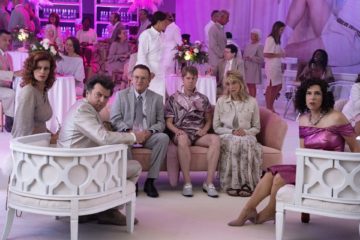 The best moments on television shine for lots of different reasons. They can be heartwarming, tearjerking, shocking – or, sometimes, so viscerally uncomfortable that they keep replaying in your head long after the episode or even the series is over.
The best moments on television shine for lots of different reasons. They can be heartwarming, tearjerking, shocking – or, sometimes, so viscerally uncomfortable that they keep replaying in your head long after the episode or even the series is over.
“What It Takes”, the sixth episode of the third series of the HBO drama Succession, ends with just such a moment. Logan Roy, ruthless patriarch of both his family and their media empire, has chosen to support a repugnant, near-fascist presidential nominee and is demanding that his children line up for a photograph with this man. His daughter, who has already aired her opposition to the choice and been ignored, is hovering on the sidelines of the photoshoot refusing to get into frame. This is when Logan (played by a magisterial Brian Cox) walks over to her and in a menacing undertone delivers the killer line. “Siobhan, are you part of this family or not?” For a second, the choice to answer “No” flickers across her face. Then she knuckles under, lines up and pastes on a smile for the camera. It’s a brutal and brief encapsulation of the show’s fundamental tension: the three-way fight between morality, loyalty and self-interest. In Succession, the family always wins even as its members lose.
More here.
Mud and Dirt: Vivian Suter’s Paintings
Morgan Meis at Slant Books:
 There is something that especially delights me about the story, and then also the paintings, of Vivian Suter, who happens to have a show up right now at the extension of the Reina Sofia Museum in Madrid, the extension being a large building in Retiro Park called the Velazquez Palace, which is packed full right now with hundreds of paintings by Vivian Suter, more paintings than I have maybe ever seen in a one-person show and this, indeed, is part of the delight of Vivian Suter, part of what is so fascinating about Vivian Suter, namely, that she doesn’t seem to care about her canvases all that much and so you can pack a smallish palace with hundreds of them, hanging all over the place, lying in piles, whatever, some of them covered in dirt and other detritus and a couple of them marked with what seems to be the footprints of dogs, pawprints I guess.
There is something that especially delights me about the story, and then also the paintings, of Vivian Suter, who happens to have a show up right now at the extension of the Reina Sofia Museum in Madrid, the extension being a large building in Retiro Park called the Velazquez Palace, which is packed full right now with hundreds of paintings by Vivian Suter, more paintings than I have maybe ever seen in a one-person show and this, indeed, is part of the delight of Vivian Suter, part of what is so fascinating about Vivian Suter, namely, that she doesn’t seem to care about her canvases all that much and so you can pack a smallish palace with hundreds of them, hanging all over the place, lying in piles, whatever, some of them covered in dirt and other detritus and a couple of them marked with what seems to be the footprints of dogs, pawprints I guess.
As the story goes, Suter, born in Argentina in 1949 but then living in Switzerland as a young woman, Suter was sort of making her way as an abstract painter in the European artworld from the mid-60s to the early 80s and then she took a trip to Central America in 1982 and, basically, she never came back.
More here.
Popper’s Plato
Tae-Yeoun Keum at Hedgehog Review:
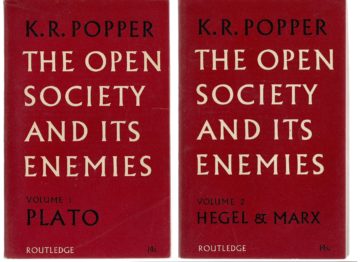 Today, The Open Society and Its Enemies is perhaps best remembered for two things: Karl Popper’s coinage of the terms “open society” and “closed society,” and his scorched-earth attack on Plato as the original architect of the latter. For Popper, Plato was the first and the most influential authoritarian thinker. (Popper’s analogous charges against Aristotle, Marx, and Hegel have not proven as memorable.)
Today, The Open Society and Its Enemies is perhaps best remembered for two things: Karl Popper’s coinage of the terms “open society” and “closed society,” and his scorched-earth attack on Plato as the original architect of the latter. For Popper, Plato was the first and the most influential authoritarian thinker. (Popper’s analogous charges against Aristotle, Marx, and Hegel have not proven as memorable.)
Popper conceived of the difference between open and closed societies as a difference in their respective cultures of knowledge. Open societies were distinguished by their democratic culture of criticism, which made commonly held beliefs available for critique and revision, and in so doing, embraced innovation. Closed societies, by contrast, lacked this “critical attitude.” They were instead sustained by the “dogmatic” power of myths, which preserved existing power structures and stifled social change.
more here.
Karl Popper And Ernst Gombrich
Revolt and Rococo At The Met
Anne Higonnet at Artforum:
 Curator Wolf Burchard has astutely understood that some of the Met’s least appreciated objects have become cultural icons, just not in the way the museum usually presents them. The Met owns one of the world’s best collections of eighteenth-century “decorative arts”; they usually languish in the museum’s emptiest galleries. Yet when Disney animated them into characters like the candlestick Lumiére in Beauty and the Beast or into scenes in Cinderella (1950), which features the heroine’s rags spiraling into a court gown, they have beguiled mass audiences. The Met rightly makes the essential formal point that Disney was inspired by the inherent animation of Rococo design, its kinetic furniture equipped with multiple moving parts and frothy ornament. To help us understand how widely this impulse pervaded eighteenth-century European culture, the museum cleverly displays a copy of a novel, Le Sopha: Conte Moral. The 1742 best seller, like many stories of its time, revolves around a thing that thinks.
Curator Wolf Burchard has astutely understood that some of the Met’s least appreciated objects have become cultural icons, just not in the way the museum usually presents them. The Met owns one of the world’s best collections of eighteenth-century “decorative arts”; they usually languish in the museum’s emptiest galleries. Yet when Disney animated them into characters like the candlestick Lumiére in Beauty and the Beast or into scenes in Cinderella (1950), which features the heroine’s rags spiraling into a court gown, they have beguiled mass audiences. The Met rightly makes the essential formal point that Disney was inspired by the inherent animation of Rococo design, its kinetic furniture equipped with multiple moving parts and frothy ornament. To help us understand how widely this impulse pervaded eighteenth-century European culture, the museum cleverly displays a copy of a novel, Le Sopha: Conte Moral. The 1742 best seller, like many stories of its time, revolves around a thing that thinks.
more here.
James Webb: ‘Fully focused’ telescope beats expectations
Jonathan Amos at the BBC:
 Engineers say they have now managed to fully focus the $10bn observatory on a test star. The pin-sharp performance is even better than hoped, they add.
Engineers say they have now managed to fully focus the $10bn observatory on a test star. The pin-sharp performance is even better than hoped, they add.
To get to this stage, all of Webb’s mirrors had to be aligned to tiny fractions of the width of a human hair.
But the agency cautions that a lot of work still lies ahead before the telescope can be declared operational.
Lee Feinberg, the Nasa engineer who has led the development of Webb’s optical elements, described the release of the first properly focused image as phenomenal.
“You not only see the star and the spikes from the diffraction of the star, but you see other stars in the field that are tightly focused, just like we expect, and all sorts of other interesting structure in the background,” he told reporters.
More here.
Chris Hannibal: Second Oldest Trick in Sleight of Hand
Ukraine: On the Fault Line Between East and West
Michael J. Totten in Quillette:
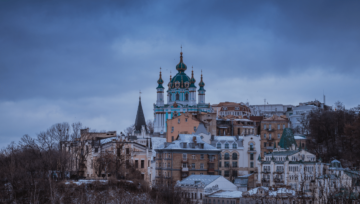 MSNBC’s Joy Reid thinks the West’s galvanizing response to Russia’s invasion of Ukraine is unfair. “Let’s face it,” she said on March 8th, “the world is paying attention because this is happening in Europe. If this was happening anywhere else, would we see the same outpouring of support and compassion?”
MSNBC’s Joy Reid thinks the West’s galvanizing response to Russia’s invasion of Ukraine is unfair. “Let’s face it,” she said on March 8th, “the world is paying attention because this is happening in Europe. If this was happening anywhere else, would we see the same outpouring of support and compassion?”
The Western world is indeed less interested in the victims of war in places like Yemen and Syria, but there’s more to the distinction than Reid’s commentary allows. It’s not just that Ukraine is, as Reid put it, “white and largely Christian”—Russia is also mostly white and Christian, yet the vast majority of Westerners would side with non-white, non-Christian Japan (to name just one example) if it suddenly found itself in a hot war with Putin’s military.
A nuclear conflict is also a possibility for the first time since the collapse of the Soviet Union, and no serious person thinks the wars in Syria or Yemen are likely to lead to a global apocalypse.
More here.
Friday Poem
Welcome to the Age of The Beautiful Weirdos
this morning the lady across from
me in the waiting room asked me
if I was ready for things
to “get back to normal”
I smiled and shook my head
“I wasn’t very good at normal,” I told her.
“I’d like the give weird a bit of a try.”
She blinked.
I blinked back.
things had gotten awkward
I always make things awkward
She blinked again.
I responded with another blink.
We were now communicating
through eyelash morse code.
So I blinked the following message to her:
I’m not waiting for things
to go back to normal
things are already
way too ordinary for me
to wish for it to have
any more of a hold over me
to be honest,
I’m waiting for things
to become more abnormal
normal had its time as the DJ
normal played the same songs over and over
typical’s reign as the queen has gone on for so long
that her crown has begun to grow into her skin
I know you can sense it, too
this cocoon we are living in
is starting to quiver and our
skin is starting to turn into
Read more »
